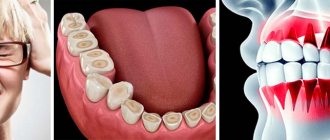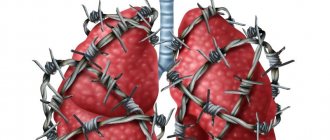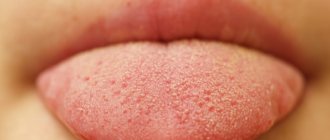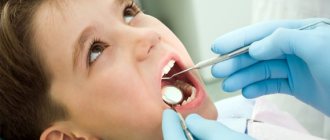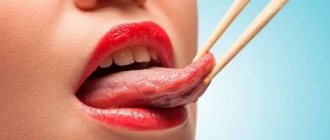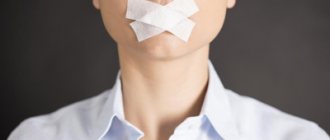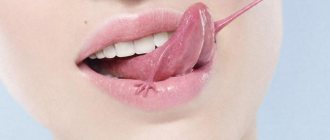Glossalgia is a disease that consists of the appearance of pain and a burning sensation of the tongue in the absence of obvious causes and other clinical manifestations on the mucous membranes. Sometimes similar symptoms spread to the lips, palate or the entire oral mucosa. Middle-aged and elderly women are more often susceptible to this disease; in men it is several times less common.
Unlike other diseases, with glossalgia there are no organic causes of pain. Despite the fact that patients often note the development of pain after injuries, the latter can only act as a trigger factor. The disease should be distinguished from glossitis, an inflammatory disease in which, in addition to pain and burning, external changes in the mucous membranes are observed: redness, ulceration, pronounced plaque, etc.
Causes of glossalgia
Many patients with glossalgia associate the appearance of the symptom with trauma to the tongue from sharp edges of fillings or teeth with chipped enamel, as well as incorrectly installed crowns and dentures. More often, the disease appears after disorders of the autonomic nervous system. As the disease progresses, it becomes chronic.
This is a functional disorder that has no organic causes. Researchers associate its appearance with diseases of the gastrointestinal tract. Most often there is a combination of disorders of the nervous system, vascular lesions and diseases of the digestive system. A stimulating factor can be diseases that lead to a decrease in tissue sensitivity or change the response to mechanical stimuli.
Glossalgia can also develop against the background of the following diseases:
- ischemic and hemorrhagic stroke;
- encephalitis of any origin;
- neurosyphilis.
Aggravating factors may include hypovitaminosis, lack of iron, minerals, endocrine diseases, infections and autoimmune pathologies. The disease is also affected by taking certain medications - chemotherapy drugs, antihistamines, etc.
Research shows that the disease may be one of the signs of viscero-reflex bulbar syndrome, which affects the vagus and glossopharyngeal nerves. Disturbances in the transmission of nerve impulses cause glossalgia, as they lead to the appearance of false sensations. And external irritants can only intensify the symptom, which explains the high incidence of the disease in people with dentures and crowns.
Ask a Question
Organ structure
The tongue has 3 parts - the root, the body, and the apex. Each part is covered with epithelium and mucous membrane, the surface of which is equipped with various types of papillae (mushroom-shaped, filiform, groove-shaped, leaf-shaped).
- The entire surface of the organ is covered with filament papillae. Their structure resembles the shape of thin threads, which is why they got their name. The filament papillae do not have taste buds.
- Leaf-shaped papillae are located on the sides and back of the organ. They look like little folds. The leaf-shaped papillae have taste buds.
- The fungiform papillae are located in the center and at the top of the tongue. They are small red dots; taste buds are present in the epithelium of the fungiform papillae.
- The circumvallate papillae are located in the posterior part and in the body of the organ. Among all the others, the circumvallate papillae are the largest, but they also contain taste buds.
There are blood vessels throughout the muscle tissue of the tongue.
Manifestations of glossalgia
With this disease, patients note a burning sensation, tingling, itching, and rawness in the tongue area. An unpleasant symptom may appear from time to time or bother you constantly. Some patients associate these symptoms with eating spicy foods.
Indirect symptoms include dry mouth and fatigue when speaking. It is worth noting that with overwork and nervous excitement, the symptoms become more pronounced. Sometimes the symptoms of glossalgia appear only in certain situations, for example, before an important event. During meals, manifestations of the disease may become less pronounced or even completely absent.
The feeling of burning and tingling most often spreads to the sides and tip of the tongue. They occur much less frequently on the back and root of the tongue. The pain is widespread, there is no obvious focus, and the location can change quickly. The symptom may disappear and appear in another area.
It is important to note that there are no visible changes in the mucous membrane of the tongue and oral cavity. Only some people suffering from this disease may experience swelling or plaque on the tongue, hypertrophy of the lingual papillae. Varicose veins of the tongue are typical for elderly patients.
Many people with glossalgia experience symptoms of depression. Sometimes there is excitability, increased anxiety, and suspiciousness. Many people suffer from fear of developing cancer and other serious diseases, and the disease is accompanied by sleep disturbances, pain in the chest area, etc.
When to see a doctor
If this is not the first time a burning sensation in the mouth has occurred, and the culprit is NOT spicy food, then this is a reason to consult a doctor. Based on the above reasons, doctors of various specialties can deal with this problem. First of all, these are therapists. A general practitioner, based on the history taken, will be able to exclude a number of pathologies and refer the patient to the right specialist. Among them are dentists, endocrinologists, infectious disease specialists, gastroenterologists and others.
Important! During the interview, the doctor should tell you about all concomitant diseases, lifestyle and medications you are taking. This information will help the doctor rule out a number of diseases and quickly identify the cause of the symptom.
Possible complications
This disease does not threaten health, but significantly reduces the quality of life. If you ignore an unpleasant symptom, glossalgia can become chronic. Its symptoms will occur from time to time, exacerbating the unstable psycho-emotional state. Against the background of pain, anxiety, eating disorders, sleep disorders, nervousness, and phobias can develop. As the condition worsens, treatment should be carried out not only by the dentist, but also by other specialists - a neurologist, psychiatrist or psychotherapist.
A long-lasting symptom can cause forced dietary restrictions, which can affect the overall health and cause vitamin deficiencies, weight loss, and lack of minerals.
Possible complications include inflammatory diseases of the oral cavity. For example, a lack of saliva can lead to aphthous stomatitis, and when exposed to adverse factors or injuries, the likelihood of glossitis, gingivitis and other ailments increases.
Important Tips
You can reduce the risk of discomfort and also relieve pain if you follow simple but important recommendations:
- Carry out oral hygiene regularly. If the tip of the tongue is already inflamed, then it should not be touched during hygiene measures. After brushing your teeth, it is recommended to rinse your mouth with decoctions based on medicinal herbs. An analogue of herbal decoctions are antiseptic drugs - Chlorhexidine, calendula infusion, Chlorophyllipt.
- Acute pain can be reduced by using anesthetic solutions.
- The inflamed organ should not be rubbed against tooth enamel.
- During treatment you should avoid eating hot or sour foods. It is important to protect the inflamed organ from contact with aggressor substances and products. In order not to injure the inflamed tongue, it is recommended to avoid eating solid food.
- Remove plaque formed on the mucous membrane with a cotton swab soaked in a disinfectant or anesthetic solution.
- Oils will help quickly relieve tongue pain. Rosehip, sea buckthorn or peach oil has an active analgesic effect. To eliminate discomfort, a small amount of the selected oil is applied to the injured part of the tongue.
- If an abscess forms on the inflamed tip, then self-treatment is contraindicated. It is forbidden to open or squeeze out the abscess. All therapeutic measures in this case are carried out in a medical institution.
Sources used:
- Oral hygiene / Yu.A. Fedorov. — M.: Medicine
- Medicines in dentistry. Directory / L.N. Maksimovskaya, P.I. Roshchina. — M.: Medicine
- First St. Petersburg State Medical University named after. acad. I.P. Pavlova
- Adaptive mechanisms of local immunity of the oral and pharynx mucosa / Maryam Gumerova, Liliya Aznabaeva and Nina Arefieva. - M.: LAP Lambert Academic Publishing, 2013.
Diagnostic features
It is important to distinguish glossalgia from organic diseases of the tongue that develop as a result of injuries, neuralgia and neuritis. The doctor will also make sure that there are no bite defects. The main diagnostic criterion for glossalgia is the discrepancy between the sensations of the intensity of the impact. In addition, visible changes in the tongue and mucous membranes are almost completely absent.
In case of injuries, the pain has a clear localization and does not spread beyond the boundaries of the lesion. With neuralgia, sensations occur briefly in the area of innervation of the nerve. With neuritis, pain most often appears only on one side, and is also accompanied by sensory disturbances.
Allergy
It manifests itself as redness and swelling of the mucous membrane due to contact with allergens. Their role may include: certain foods, drinks, toothpaste components, etc.
Important!
If there is an increase in the size of the tongue, you should immediately call an ambulance, as this may indicate the onset of an acute reaction, which can lead to swelling of the larynx and even respiratory arrest.
Treatment of allergies comes down to stopping contact with objects that cause a similar reaction. Antiallergic (antihistamine) drugs are also prescribed.
Allergy
Taking care of your tongue should become a daily habit like brushing your teeth. If you experience the slightest discomfort or pain, you should contact your dentist (or therapist) for help. Treatment largely depends on the correct diagnosis. A qualified specialist is able to determine the root cause and refer, if necessary, to a specialized doctor.
Notice
: Undefined variable: post_id in
/home/c/ch75405/public_html/wp-content/themes/UltraSmile/single-item.php
on line
45 Notice
: Undefined variable: full in
/home/c/ch75405/public_html/wp-content /themes/UltraSmile/single-item.php
on line
46
Rate this article:
( 1 ratings, average: 5.00 out of 5)
language
Treatment methods
Treatment of glossalgia begins with sanitation of the oral cavity: the doctor will prescribe treatment for caries, replacement of incorrectly installed dentures, as well as replacement of fillings that have expired. Making new dentures allows you to create the correct bite height. Also, at the same time, it is necessary to visit other specialists of a narrow profile - a neurologist, endocrinologist, psychotherapist, etc.
The main treatment tactic is to influence the links of the pain symptom. So, the doctor may prescribe bromine, iron, tranquilizers, and sedatives. B vitamins and lingual nerve blocks may be recommended to help restore normal function.
If the mucous membranes are dry and there is insufficient salivation, the doctor will prescribe a vitamin A solution or another product to moisturize and stimulate saliva production.
Reflexology and physiotherapeutic methods can be used as an addition to the main course of treatment. If suspiciousness, increased anxiety, or depression are present, then working with a psychotherapist is indicated.
General recommendations include the following:
- A gentle diet - eating soft foods, avoiding sour, salty, fatty foods, spices and seasonings.
- Normalization of neurological status if necessary. As prescribed by a neurologist or psychiatrist, you can take antidepressants, anti-anxiety medications, nootropics, and drugs to improve sleep.
- Psychotherapy according to indications. In some cases, good results can be achieved with the help of short-term or long-term psychotherapy.
It is important to be attentive to your psycho-emotional state. Relaxation methods, development of stress resistance, and breathing exercises may be recommended to bring the psychological state into balance.
How to get rid of pain on your own?
Regular use of folk remedies will soothe irritated mucous membranes, relieve inflammation, accelerate tissue regeneration, and relieve a person from pain and discomfort.
Sage decoction
Sage has active anti-inflammatory properties.
Preparation:
- 10 gr. pour 200 ml of dry plant material. boiling water;
- pour the mixture into a thermos and leave for a couple of hours.
Rinse your mouth with sage decoction three times a day. During the therapeutic procedure, try to “hold” the healing decoction as long as possible near the inflamed tip of the tongue.
Honey
Many people know about the healing properties of beekeeping products. Honey has antibacterial, anti-inflammatory, wound healing, analgesic and other important qualities.
Honey is used to treat various diseases, including stomatitis and traumatic injuries to the mucous membrane of the tongue.
Method of treatment:
- rinse your mouth with clean water;
- put 1/2 teaspoon of honey on the tip;
- keep the product in your mouth until it is completely dissolved.
The procedure can be repeated up to 5 times a day. The recipe can only be used if there are no allergic reactions to bee products.
People suffering from diabetes or obesity are advised to choose a different method. This is due to the fact that honey contains a large amount of sugar.
Painkillers
In case of acute pain, it is recommended to rinse the mouth with anesthetic solutions - Lidocaine, Novocaine, Anestezin.
For moderate pain, it is more effective to use medications that simultaneously alleviate pain and disinfect - Miramistin, Furacilin.
